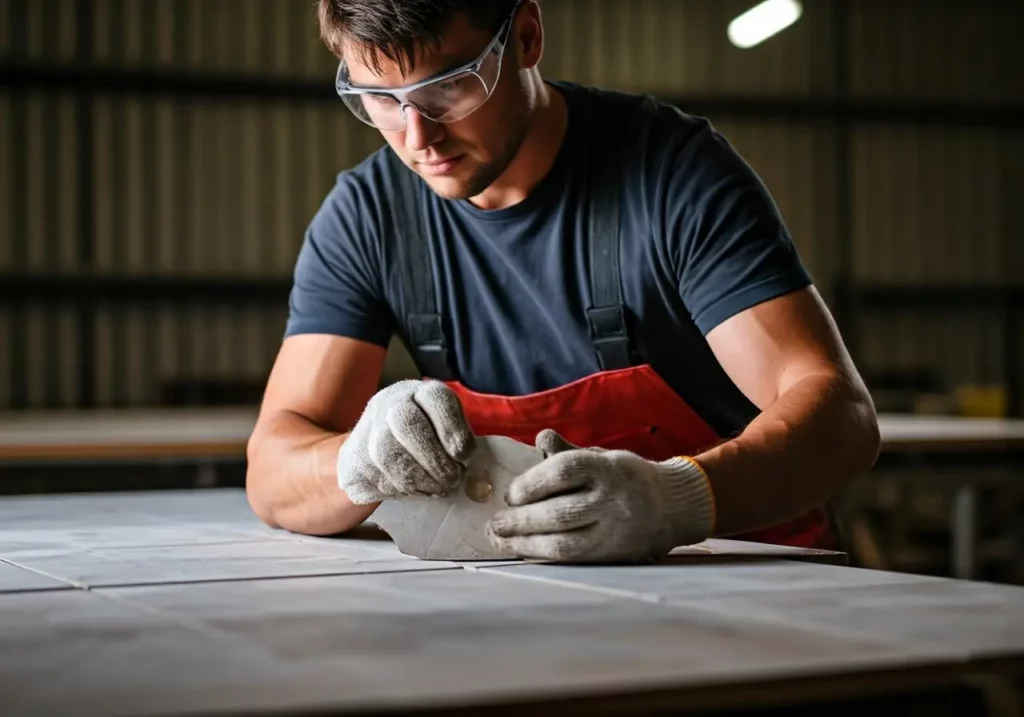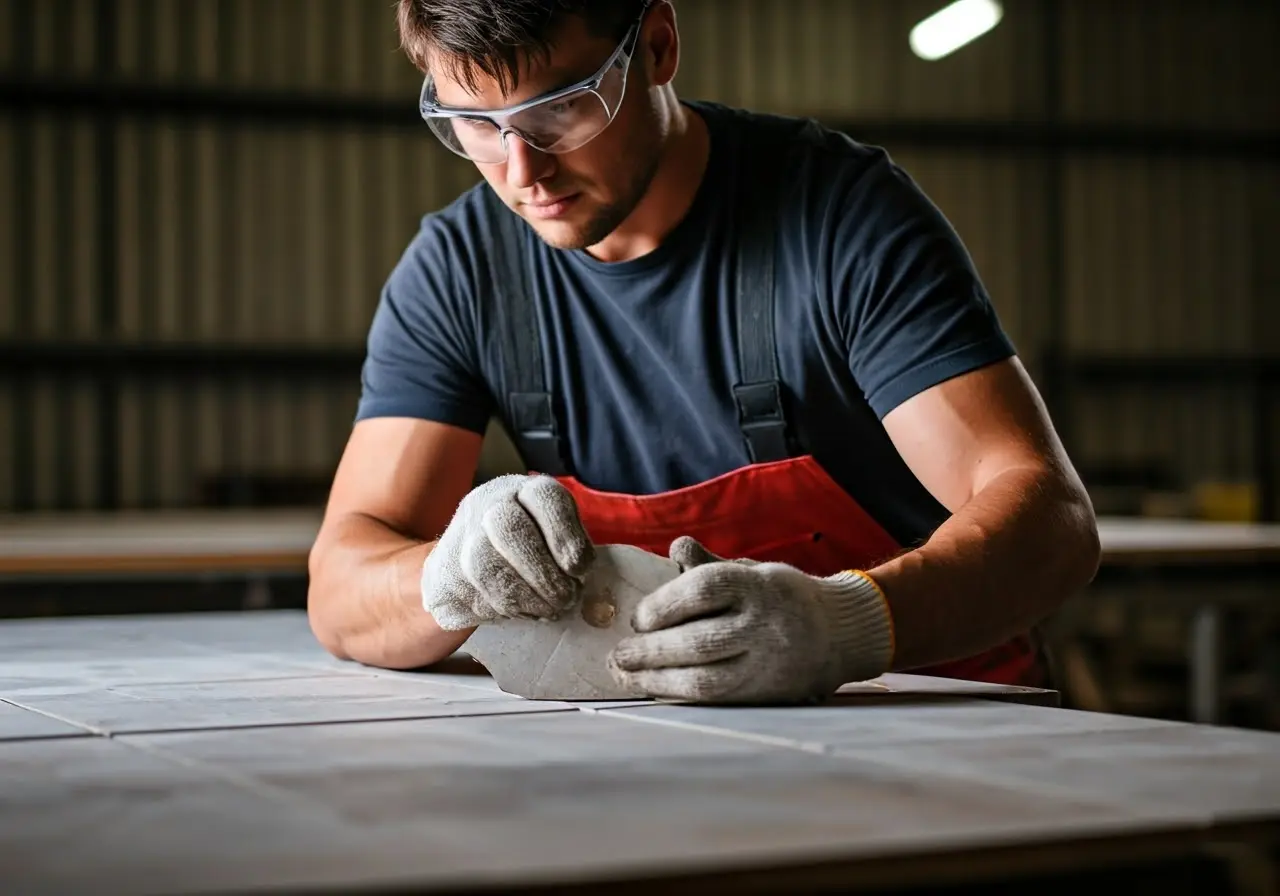In today’s world, maintaining both quality and sustainability is paramount for tile manufacturers. As consumers become increasingly aware of their environmental footprint, they’re also looking for products that meet high standards of excellence. This blog will delve into how tile manufacturers balance these demands to deliver outstanding products.
The Importance of Quality in Tile Manufacturing
Quality is the cornerstone of tile manufacturing. From durability to aesthetics, high-quality tiles provide long-lasting performance that meets the needs of consumers. Manufacturers employ rigorous testing and standards to ensure their tiles can withstand wear and tear, resist stains, and maintain their appearance over time.
One key metric that defines tile quality is the PEI rating. This rating system measures the surface wear of tiles, helping manufacturers determine where their tiles can be best used. Tiles with a PEI rating of 1 are suitable for walls, while those with a rating of 5 can handle heavy commercial traffic. By carefully selecting appropriate ratings for their products, manufacturers ensure that their tiles meet the highest standards of performance and longevity.
Manufacturers also conduct tests to measure water absorption rates, as lower rates indicate higher quality and better suitability for moisture-prone areas like bathrooms and kitchens. Porcelain tiles, for instance, often have a water absorption rate of less than 0.5%, making them ideal for both indoor and outdoor use. This meticulous approach to quality assurance assures customers that the tiles they purchase will be both durable and beautiful.
In addition to these technical standards, visual inspections play a crucial role in quality control. Tiles are evaluated for uniformity in size, color, and finish to ensure they meet precise specifications. Any imperfections, such as cracks or inconsistencies, are identified and addressed before the tiles reach the market. This comprehensive quality control process means that customers receive tiles that not only meet functional requirements but also contribute to the visual appeal of their spaces.
Advanced Manufacturing Techniques
Modern tile manufacturing techniques have evolved to enhance quality and efficiency. Automation, precision cutting, and advanced firing methods contribute to the production of high-quality tiles. These techniques also minimize waste and improve the consistency of the final product.
Automation in tile manufacturing allows for precise control over every aspect of the production process, from mixing raw materials to cutting and shaping tiles. This not only ensures a high degree of consistency but also boosts overall productivity. For example, computerized cutting equipment can produce intricate designs with pinpoint accuracy, making it possible to create tiles with unique patterns and shapes that would be difficult to achieve by hand.
Advanced firing techniques, such as rapid single firing (RSF), play a significant role in enhancing tile quality. RSF involves firing tiles at high temperatures in a single cycle, which strengthens the tile and enhances its durability. This process also reduces energy consumption compared to traditional firing methods, aligning with sustainability goals while maintaining high manufacturing standards.
Tile manufacturers also employ innovative glazing technologies to enhance the aesthetics and functionality of their products. Glazes can be formulated to provide various finishes, from glossy to matte, and can include properties like anti-slip surfaces or added resistance to stains. These advancements in glazing not only improve the visual appeal of the tiles but also contribute to their practical benefits.
Moreover, modern manufacturing facilities are designed with efficiency in mind, incorporating energy-saving measures and waste reduction strategies. By optimizing the use of resources and leveraging cutting-edge technology, tile manufacturers can achieve exceptional quality while minimizing their environmental impact.
Sustainable Sourcing of Raw Materials
Sustainability starts with responsible sourcing. Tile manufacturers are increasingly turning to eco-friendly raw materials. These include recycled content and materials that are sustainably harvested. By choosing such sources, manufacturers reduce the environmental impact of their production processes.
For instance, many manufacturers now use recycled glass and ceramics in their tile production. These materials not only reduce the demand for virgin raw materials but also help divert waste from landfills. By incorporating recycled content into their products, manufacturers can create beautiful tiles that are both sustainable and resource-efficient.
Sustainably harvested materials, such as certain types of clay and natural stone, are also becoming more prevalent in the industry. These materials are extracted using methods that minimize environmental disruption and promote long-term ecological balance. By prioritizing materials sourced in an environmentally responsible manner, manufacturers demonstrate their commitment to sustainability.
Additionally, manufacturers are exploring innovative materials that have a lower environmental footprint. For example, some companies are developing tiles made from bamboo, a highly renewable resource that grows quickly and requires minimal pesticides or fertilizers. Such alternatives not only offer unique aesthetic options but also align with sustainability objectives.
Eco-Friendly Production Processes
From reducing energy consumption to minimizing emissions, eco-friendly production processes are critical for sustainability. Many tile manufacturers have adopted green technologies, such as solar power and waste recycling, to lower their carbon footprint. These practices not only benefit the environment but also result in cleaner, safer working conditions.
One significant advancement in this area is the utilization of renewable energy sources. Some manufacturers have installed solar panels or wind turbines at their facilities to generate clean energy. This approach not only reduces reliance on fossil fuels but also cuts down on greenhouse gas emissions, contributing to a more sustainable production process.
Another key initiative is the implementation of closed-loop water systems. These systems recycle and reuse water within the manufacturing process, drastically reducing water consumption and minimizing waste. By treating and reusing process water, manufacturers can ensure that their operations are more efficient and eco-friendly.
Waste reduction is also a priority for many tile manufacturers. By reusing scrap materials and optimizing production processes, companies can significantly decrease the amount of waste generated. For example, excess clay and broken tiles can be reincorporated into the production cycle, reducing the need for landfill disposal and conserving resources.
Manufacturers are also investing in technologies to reduce emissions. For instance, advanced kiln designs and exhaust treatment systems can lower harmful emissions released during the firing process. These innovations help ensure that the environmental impact of tile production is minimized, aligning with broader sustainability goals.
Furthermore, eco-friendly production processes often lead to improved working conditions. Cleaner, more efficient manufacturing environments contribute to the health and well-being of employees, which in turn can enhance productivity and job satisfaction. By prioritizing sustainability, tile manufacturers are creating a positive impact not only on the planet but also on their workforce.
Innovative Designs and Green Certifications
Innovation and design play a crucial role in maintaining sustainability. Tiles that incorporate recycling and sustainability certifications, such as LEED, assure consumers of their eco-friendliness. This reflects a commitment to both aesthetics and environmental responsibility.
LEED (Leadership in Energy and Environmental Design) certification is a globally recognized symbol of sustainability achievement. Tiles that meet LEED standards have undergone rigorous evaluation to ensure they contribute positively to a building’s overall environmental performance. For consumers, choosing LEED-certified tiles is an easy way to support sustainability efforts while enhancing the aesthetic appeal of their spaces.
Manufacturers are also exploring new design possibilities with eco-friendly materials. For example, mixed material tiles combining recycled glass and natural stone offer unique textures and visual interest. These innovative designs not only stand out aesthetically but also reinforce sustainable practices.
Incorporating transparency into the design process is another key trend. Consumers increasingly want to know the origin and environmental impact of the products they purchase. Manufacturers respond by providing detailed information about the sourcing, production, and sustainability credentials of their tiles. This transparency builds trust and allows consumers to make informed choices.
Consumer Education and Transparent Practices
Educating consumers about sustainable choices and transparent manufacturing practices helps build trust. Tile manufacturers are increasingly providing information about their sourcing, production, and sustainability efforts. This transparency allows consumers to make informed decisions and support manufacturers that prioritize quality and sustainability.
One effective way of educating consumers is through comprehensive product labeling. Labels that clearly indicate the sustainable attributes of a tile, such as its recycled content or water absorption rate, empower consumers to choose products that align with their values. Detailed labels and certifications, like LEED, provide reassurance that their purchasing decisions positively impact the environment.
Many tile manufacturers are also leveraging digital platforms to share their sustainability narratives. Websites, blogs, and social media channels offer rich opportunities to communicate the environmental benefits and quality aspects of their products. Frequent updates and engaging content help keep consumers informed and connected with the brand’s sustainability journey.
Workshops and showroom events are additional avenues for consumer education. These events present opportunities for consumers to learn about tile manufacturing processes, quality standards, and sustainable practices first-hand. By engaging directly with the public, manufacturers can demystify the production process and highlight the efforts made to ensure eco-friendly practices.
In summary, transparent practices and consumer education are essential components of a successful sustainability strategy for tile manufacturers. By clearly communicating their efforts and achievements, manufacturers can build stronger relationships with their customers and encourage more environmentally responsible purchasing decisions.
Balancing Quality and Sustainability for a Better Future
By adhering to stringent quality control measures and embracing sustainable practices, tile manufacturers are ensuring that their products not only meet the expectations of discerning consumers but also contribute to a healthier planet. As the industry continues to innovate, we can look forward to even more advancements that harmonize quality with sustainability.


